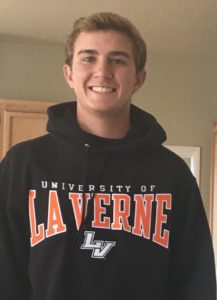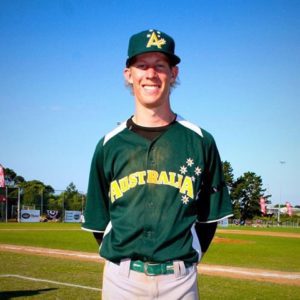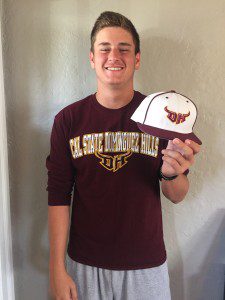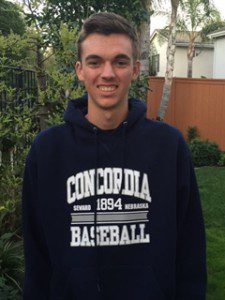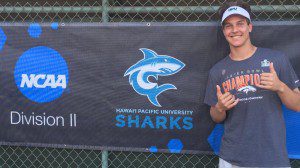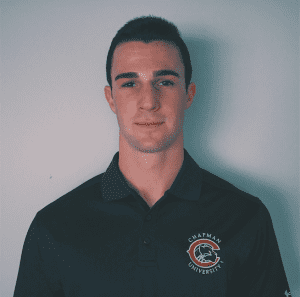We at SportsForce would like to congratulate
Ryan Novis on his commitment to
St. Mary’s College. Here are Ryan’s recruiting story and interview after he committed. Good luck as a
Gael!
1. Share your recruiting story and status We started the recruiting process late but didn’t know it. At first, we didn’t think we needed help, but after a while what we were hearing from recruiters, schools, and showcases did not add up. Everyone was very positive, and despite our son’s many accolades (All District, All State, Junior All American) our communication with the colleges seemed to stall. We sought out Andrew and his team at SportsForce and they had an immediate impact for us. They helped us move beyond the marketing hype and wishful thinking and were able to give us the real information we could act on, even when we didn’t want to hear it. They were always honest and supportive, a tough combination. With their help, we reworked Ryan’s profile and videos (never underestimate how important this is!) and they could tell us who was really interested in Ryan and who was trying to collect a fee for a camp. Being recruited is a highly competitive process, especially on the west coast where the number of talented athletes outnumbers the available scholarship opportunities nearly five to one. The process starts earlier and earlier and is more competitive in every way. To be honest, I am not sure how the Coaches themselves manage to navigate this process. It’s challenging for everyone, but Andrew and his team helped us get a handle on it, helped us put together a real plan we could act on, and they supported us through our efforts. In the end, the offers started to come and when the right school offered Ryan, everyone in the family was informed enough to know that it was the right offer. In the end, we feel incredibly blessed because Ryan found exactly the right opportunity, at the right school for him and we could not be happier. I do not believe this would have been possible without the help of the Sportsforce team.
2. What school are you going to, and why did you choose them? Ryan is going to St. Mary’s College in Moraga, CA. Ryan selected St. Mary’s because it had the best of all the factors that mattered the most to him. They are a division 1 school that competes in the West Coast Conference. They need players in Ryan’s position – outfield, and the school is well known for its academics. As a final bonus, it is located in Northern California, a beautiful part of the country.
3. How did SportsForce help in the process? 1) Advice – Andrew provided excellent and honest assessments 2) Programs – the email template, campaigns and tracking sheets made things much more manageable 3) Q&A – They helped us prepare for conversations with coaches and campus visit 4) Video editing – they took our raw footage and dramatically improved the presentation 5) Insight – The events we attended that were recommended by the SportsForce team lead to real recruiting conversations. 6) Encouragement – It can be a long frustrating process and SportsForce was always supportive and encouraging.
4. What advice would you give to other players and parents with the recruiting process? There are a lot of people who are happy to sell you what you want to hear. In my business I work with many advisors, some of them earning many hundreds of dollars per hour and they are well worth it because of the trouble they save me. Once I realized that Andrew and his team were much they same, their value became obvious. Get with their program and follow it. Early. If your son (or daughter) really does have what it takes to play at the next level, having a solid advisor, in my opinion, makes that process easier to navigate.
5. How excited are you for your future in college? Ryan is extremely excited about his future in college as is the whole family.
6. How much money do you anticipate your family saving in college expenses? We will have saved about $100,000 due to the athletic scholarship money.
7. Would you recommend SportsForce to any other student-athletes? Why? I would absolutely recommend SportsForce for all the reasons I have mentioned above.
Our Mission at SportsForce Baseball: We are on a mission to help our select number of qualified and evaluated players maximize their recruiting offers and make the best college decision. Started by CEO & founder Andrew Beinbrink, SportsForce Baseball is a nationally recognized college recruiting advisory group with over 40 former college coaches, players, and MLB scouts in 10 different states. During the last 11+ years, we’ve helped over 1,000 players make their college commitments. Read below, why we are different from every recruiting group in the country.
Why SportsForce is Different: * View our Home Page Video Unlike most recruiting companies, we do not just partner with anyone for our hands-on recruiting programs. Instead, we only partner with qualified players who meet our
Five academic, athletic, and coachability selection factors. We evaluate between 10,000-12,000 players each summer and fall at top showcases and selectively advise, and advocate for only a limited number of players each year by directly contacting college coaches to help them maximize recruiting offers. Each of our expert college recruiters is limited to how many players they will advise so there is the best combination of hands-on guidance and personal recruiting outreach to college coaches.
Social Media Exposure: We also utilize our growing Twitter following at
@SportsForceBB which is followed by over 500 NCAA D1, D2, D3, NAIA, and JC coaches nationwide and growing fast.
To Get Evaluated by Our Expert College Recruiting Staff: Option 1: Complete our Recruiting Questionnaire Option 2: Email us at
scouting@sportsforceonline.com Options 3: DM us on Instagram
@SportsForceBB or Twitter
@SportsForceBB and share recent video, stats, or measurables (velocity, 60, exit speed, pop time, etc…) for our scouts to evaluate. Find out if Your Son’s Qualifies for One of Our Hands-On Recruiting Programs?
Twitter Recruiting Education & College Needs Posts: We post ongoing recruiting education and post NCAA D1, D2, D3, NAIA, and JC needs year around. Follow us on Twitter
@SportsForceBB account and join over 500 hundred NCAA D1, D2, D3, NAIA, and JC coaches nationwide that follow us and growing fast. Tagging us: If you have some good video to share with us, make sure to tag us
@SportsForceBB or DM us and we will review it.
